Dadaocheng Theatre offers star-studded performances for its second anniversary
By Hermia Lin The theatre, located on Sec.1 of Dihua Street, has been hailed as a great venue to watch and learn more about Taiwan's traditional stage-performance arts since its establishment three years ago. The Taipei Cultural Center, which oversees the operation of the theatre, started a one-year trial run in 2010 before launching the official opening of the theatre in 2011. In the last three years, audiences have seen an array of performances, exhibitions, lectures, and workshops taking place at the young theatre. A Taiwanese opera troupe, also known as a Ge-zai opera, was additionally formed. On March 9, the Taipei Cultural Center hosted a grand ceremony at Yongle Square to mark the commencement of the upcoming art event and to celebrate the second year anniversary of the theatre. Beiguan is one of the dominant traditional music genres in Taiwan. Immigrants from the Fujian province of China originally imported Beiguan in the 18th century. The music genre, sometimes referred by insiders as a form of loud music, has been firmly rooted here and is closely related to Han Taiwanese social life. Until the 1960s, Beiguan was very popular in Taiwan and the style of music was heard at many social occasions including rituals, festivals, ceremonies, processions, celebrations, weddings, funerals and other activities. After the ritual, the local media interviewed Mayor Hau; he said he was very happy to see Dadaocheng Theatre celebrating its second anniversary. He was especially happy to see some of Taiwan's prominent traditional performing arts groups, such as Hsiao Hsi Yuan Puppet Theatre and puppet master Chen Hsi-huang, appear in today's ceremony. The mayor hoped that the artistic atmosphere and the stage-performance art that once captured the heart of people in Dadaocheng area would be revitalized through the joint effort of public and private organizations. Starting March 9, a series of star-studded traditional operas, puppet performances and lectures will be staged at the Dadaocheng Theatre. The show will see Taiwan's renowned opera diva, Tang Mei-yun perform with the most beloved female opera actress, Hsu Hsiu-nien, on the same stage. Tang is best known for playing male characters while Hsu is known as playing female ones. In this drama, we will see the two stars come out of their comfort zones and exchang roles—Tang will instead play female roles, whereas Hsu will play the male roles. Be prepared to laugh out loud! The following week on March 15, 16 and 17, the Huang Chun-hsiung Puppet Theatre will bring Taiwanese puppet hero, Shih Yan-wun, alive on stage. Puppet Master Huang Chun-hsiung will do the voice over for the drama, you will not want to miss out on this puppet performance! Moreover, the famous puppet theatre singer, Ci Ching, will be singing live for all three performances. Huang is best known for innovating the art form and aesthetics of glove puppet. By infusing the beauty of the Taiwanese language into the puppet performance, his characters all come to life. Many of the characters have become classics in the modern puppet theatre scene. Huang's first puppet television series in 1970, which featured Shih Yan-wun, broke local TV rating records. The show ran for 583 episodes. To allow viewers to learn about the works and ideas of puppet art Master Huang, in greater depth, event organizers will host a special exhibition on the 8th floor of the theatre from March 16th to July 28th. The exhibition will showcase Huang's classic glove puppets that created a buzz on TV, film, and on stage from the 1950s and onwards. Larger-size puppets of Shih Yan-wun and Su Huan-chen that have never been displayed before will make their debut at the exhibition. Precious puppet props, scripts, DVDs, and models of different puppets will also be displayed. The first segment of the performance is a classical Nihon Buyo dance that portrays the changes of seasons. Through the performers' graceful movements, viewers will be carried away and meditate on time and life changes. The second part is a mixture of Taiwan's traditional music and Nihon Buyo dance. Wu Jung-chang, director of the Hung Wan Jan Classical Puppet Troupe, and Wu Wei-hao, music director of the Taiwan troupe, will work with Japanese dancers to tell the story of Guanyi Buddha. The final act offers viewers a look into the New Buyo. The segment is set to Taiwan's hit songs from the earlier days, Enka, and pop songs from Japan. The performance by the Tang Mei Yun Taiwanese Opera Company, Huang Chun-hsiung Puppet Theatre and the Taiwan-Japan collaboration will be staged at the 9th floor of the theatre. The venue can accommodate up to 500 people. As part of the celebration, the organizer has also invited four local puppet groups, the Happy Puppetry Company, the Taichung Sheng Wu Jhou Puppet Troupe, the Ki Li Gan Puppet Show, and the Hsiao Hsi Yuan Puppet Theatre, to each contribute a puppet show on the 8th floor of the theatre. The four performances will be on March 9th, 10th, 23rd, and the 24th. Lovers of traditional Taiwanese opera often gather at the theatre on weekends to watch opera performances. In spring and autumn, there will be cultural workshops on Huangmei opera, Taiwanese opera, Hakka opera, Nanguan and Beiguan. For details and a listing of the programs at the Dadaocheng Theatre, visit the official website of Taipei Cultural Center http://www.tmseh.taipei.gov.tw/ or call 02-2556-9101. For more information about the second anniversary celebration's programs, contact Miss Hsu via 02-2556-9101 ext. 288.
Staff Writer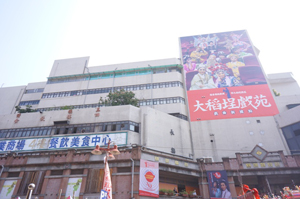 Traditional stage arts lovers will be treated to a three-week-long arts extravaganza at the Dadaocheng Theatre in Taipei until March 24th, as the theatre celebrates its second anniversary and its third year of operation.
Traditional stage arts lovers will be treated to a three-week-long arts extravaganza at the Dadaocheng Theatre in Taipei until March 24th, as the theatre celebrates its second anniversary and its third year of operation.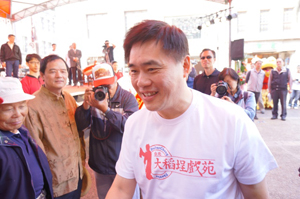 At the ceremony, Taipei Mayor Hau Lung-bin and Taipei City's Department of Cultural Affairs Commissioner Liou Wei-gong took part in a traditional blessing ritual. Followed by the ritual was a dazzling and cheerful musical performance by eight Beiguan groups based in Taipei City, who later embarked on a procession across Dadaocheng.
At the ceremony, Taipei Mayor Hau Lung-bin and Taipei City's Department of Cultural Affairs Commissioner Liou Wei-gong took part in a traditional blessing ritual. Followed by the ritual was a dazzling and cheerful musical performance by eight Beiguan groups based in Taipei City, who later embarked on a procession across Dadaocheng.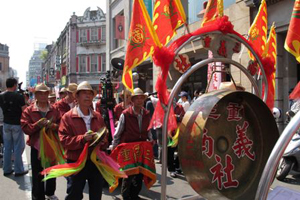 Lin Mao-hsien, a folk art researcher who hosted the ceremony on March 9th, told reporters that Beiguan music is like, "the Taiwanese version of heavy metal." Beiguan art is an invisible cultural asset of Taiwan that needs to be well preserved and passed down to the younger generation, he suggested.
Lin Mao-hsien, a folk art researcher who hosted the ceremony on March 9th, told reporters that Beiguan music is like, "the Taiwanese version of heavy metal." Beiguan art is an invisible cultural asset of Taiwan that needs to be well preserved and passed down to the younger generation, he suggested.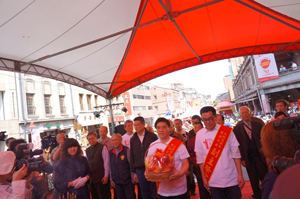 On March 9 and March 10, the Tang Mei Yun Taiwanese Opera Company will take center stage and present a humorous drama for traditional Taiwanese opera enthusiasts.
On March 9 and March 10, the Tang Mei Yun Taiwanese Opera Company will take center stage and present a humorous drama for traditional Taiwanese opera enthusiasts.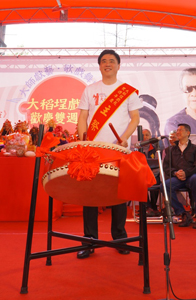 80-year-old Huang is the creator of a cast of glove puppets that have enthralled Taiwan audiences for several decades in live performances, TV series and in later years, on the big screen. In 2006, he was crowned the prestigious National Culture and Arts Award for his achievement in promoting Taiwanese glove puppet art.
80-year-old Huang is the creator of a cast of glove puppets that have enthralled Taiwan audiences for several decades in live performances, TV series and in later years, on the big screen. In 2006, he was crowned the prestigious National Culture and Arts Award for his achievement in promoting Taiwanese glove puppet art. 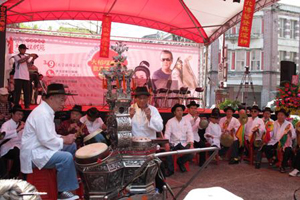 On March 23rd and 24th, audiences will be offered a chance to take a peek at Nihon Buyo, a type of traditional Japanese performing art that mixes dance with pantomime. The two performances are a joint collaboration by a Japanese Buyo group and Taiwan's Hung Wan Jan Classical Puppet Troupe.
On March 23rd and 24th, audiences will be offered a chance to take a peek at Nihon Buyo, a type of traditional Japanese performing art that mixes dance with pantomime. The two performances are a joint collaboration by a Japanese Buyo group and Taiwan's Hung Wan Jan Classical Puppet Troupe..jpg) The Dadaocheng area sits next to the Danshui River and ends at the North Gate. Encompassing three main north-south roads, Yanping North Road, Dihua Street, and Huanhe North Road, at its peak in the 1920s the area was as prosperous as the east district of Taipei City is today. The area has some of Taipei's oldest historical buildings and the first theatre, and was the cultural center of the capital and the cradle of the Taiwan New Culture Movement. Many historical buildings here are deserted, preserved only for their façades. The Department of Cultural Affairs and other public agencies have spent a great amount of time and money to renovate the area, and the Dadaocheng Theatre is a prime example of the agencies' efforts.
The Dadaocheng area sits next to the Danshui River and ends at the North Gate. Encompassing three main north-south roads, Yanping North Road, Dihua Street, and Huanhe North Road, at its peak in the 1920s the area was as prosperous as the east district of Taipei City is today. The area has some of Taipei's oldest historical buildings and the first theatre, and was the cultural center of the capital and the cradle of the Taiwan New Culture Movement. Many historical buildings here are deserted, preserved only for their façades. The Department of Cultural Affairs and other public agencies have spent a great amount of time and money to renovate the area, and the Dadaocheng Theatre is a prime example of the agencies' efforts.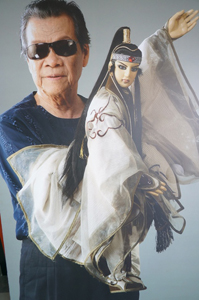 The Taipei Cultural Center has initiated the preservation of the Fujian-style façade of the Yongle Building, and renovated the 8th and 9th floor of the building before opening the theatre to the public on March 6th, 2010.
The Taipei Cultural Center has initiated the preservation of the Fujian-style façade of the Yongle Building, and renovated the 8th and 9th floor of the building before opening the theatre to the public on March 6th, 2010.

![Taiwan.gov.tw [ open a new window]](/images/egov.png)
